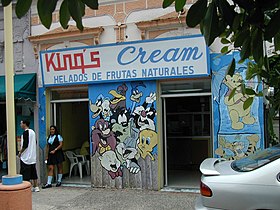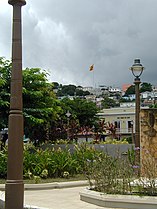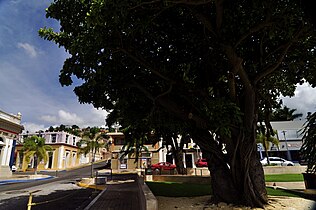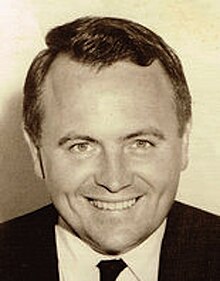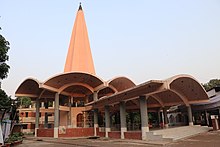야우코바리오푸에블로
Yauco barrio-pueblo야우코바리오푸에블로 푸에블로 데 야우코 | |
|---|---|
시립석[1] | |
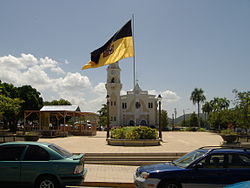 야우코바리오푸에블로 광장 | |
 야우코 시내의 야우코바리오푸에블로 위치 | |
| 좌표:18°02′11″N 66°50′58″w/18.036342°N 66.84947°W좌표: 18°02′11″N 66°50′58″W / 18.036342°N 66.84947°W/ [2] | |
| 영연방 | |
| 시 | |
| 면적 | |
| • 합계 | 0.32 sq mi(0.8 km2) |
| • 육지 | 0.32 sq mi(0.8 km2) |
| • 물 | 0 sq mi(0km2) |
| 표고 | 167피트(51m) |
| 인구 (2010) | |
| • 합계 | 3,091 |
| • 밀도 | 9,659.4/sq mi(3,729.5/km2) |
| 출처: 2010년 인구조사 | |
| 시간대 | UTC-4(AST) |
| 웹사이트 | www |
야우코바리오푸에블로(Yauco barrio-pueblo)는 푸에르토리코 시(市)인 야우코의 행정중심지(좌석)이다.2010년의 인구는 3,091명이다.[1][4][5]
스페인의 관습대로 푸에르토리코에는 중앙 광장과 시립 건물(시청), 가톨릭 교회가 들어 있는 푸에블로라는 바리오가 있다.매년 중앙광장에서 피에스타 후원회가 열린다.[6][7]
| 역사인구 | |||
|---|---|---|---|
| 인구조사 | Pop. | %± | |
| 1900 | 6,108 | — | |
| 1980 | 5,157 | — | |
| 1990 | 4,610 | −10.6% | |
| 2000 | 4,258 | −7.6% | |
| 2010 | 3,091 | −27.4% | |
| 미국 십수년 인구[8] 조사 1899년 (1990년 ~[9] 1900년) 1910년[10] 1930-1950[11] 1980-2000[12] 2010[13] | |||
중앙광장과 그 교회
중앙광장, 즉 광장은 공식적이고 비공식적인 레크리에이션 행사를 위한 장소로서 황혼부터 새벽까지 사람들이 모여 어울릴 수 있는 공간이다.19세기 초 푸에르토리코에서의 생활을 규제한 인디아 법, 스페인 법은 광장의 목적이 "당사자"(연예, 축제)를 위한 것이며(스페인어: 프로포시토 파라 라스 피에스타), 광장은 이웃(스페인어:그란데자 프로포르시오나다 알 누에로)에 비례하여 넓어야 한다고 명시하였다. 베시노스이 스페인 규정들은 또한 근처의 거리는 지나가는 사람들을 위한 편안한 포탈이어야 하며, 그들을 태양과 비라는 요소로부터 보호해야 한다고 명시했다.[6]
야우코바리오푸에블로 중앙광장 맞은편에 1934년 개교한 로마 가톨릭 교회인 파로퀴아 산티시모 로사리오가 있다.그곳에는 두 개의 다른 교회가 있었다; 나무로 만들어진 최초의 푸에블로 교회는 1754년에 지어졌고 1848년까지 후원자들이 자주 드나들었다.그리고 나서 1849년에 또 다른 교회가 세워졌다.1930년에 철거되어 현재 그곳에 서 있는 교회를 위한 공간이 마련되었다.[14]
역사
푸에르토리코는 1898년 파리 조약의 조항에 따라 스페인-미국 전쟁의 여파로 스페인에 양도되어 미국의 비법인 영토가 되었다.1899년, 미국 전쟁부는 푸에블로 바리오의 인구가 6,108명이라는 사실을 밝혀내 푸에르토리코에 대한 인구조사를 실시했다.[15]
갤러리
참고 항목
참조
- ^ a b Puerto Rico:2010:population and housing unit counts.pdf (PDF). U.S. Dept. of Commerce, Economics and Statistics Administration, U.S. Census Bureau. 2010.
- ^ a b "US Gazetteer 2019". US Census. US Government.
- ^ 미국 지질조사국 지리적 이름 정보 시스템:야우코바리오푸에블로
- ^ Picó, Rafael; Buitrago de Santiago, Zayda; Berrios, Hector H. (1969). Nueva geografía de Puerto Rico: física, económica, y social, por Rafael Picó. Con la colaboración de Zayda Buitrago de Santiago y Héctor H. Berrios. San Juan Editorial Universitaria, Universidad de Puerto Rico,1969.
- ^ Gwillim Law (20 May 2015). Administrative Subdivisions of Countries: A Comprehensive World Reference, 1900 through 1998. McFarland. p. 300. ISBN 978-1-4766-0447-3. Retrieved 25 December 2018.
- ^ a b Santullano, Luis A. (10 March 2019). Mirada al Caribe. Vol. 54. Colegio de Mexico. pp. 75–78. doi:10.2307/j.ctvbcd2vs.12. JSTOR j.ctvbcd2vs.12.
- ^ Pariser, Harry S. (2003). Explore Puerto Rico, Fifth Edition. San Francisco: Manatee Press. pp. 52–55. Retrieved 10 February 2019.
- ^ "U.S. Decennial Census". United States Census Bureau. Archived from the original on February 13, 2020. Retrieved September 21, 2017.
- ^ "Report of the Census of Porto Rico 1899". War Department Office Director Census of Porto Rico. Archived from the original on July 16, 2017. Retrieved September 21, 2017.
- ^ "Table 3-Population of Municipalities: 1930 1920 and 1910" (PDF). United States Census Bureau. Archived (PDF) from the original on August 17, 2017. Retrieved September 21, 2017.
- ^ "Table 4-Area and Population of Municipalities Urban and Rural: 1930 to 1950" (PDF). United States Census Bureau. Archived (PDF) from the original on August 30, 2015. Retrieved September 21, 2014.
- ^ "Table 2 Population and Housing Units: 1960 to 2000" (PDF). United States Census Bureau. Archived (PDF) from the original on July 24, 2017. Retrieved September 21, 2017.
- ^ Puerto Rico:2010:population and housing unit counts.pdf (PDF). U.S. Dept. of Commerce Economics and Statistics Administration U.S. Census Bureau. 2010. Archived (PDF) from the original on 2017-02-20. Retrieved 2019-08-02.
- ^ Mari Mut, José A. (2013-08-28). Los Pueblos de Puerto Rico y Las Iglesias de Sus Plazas [The Pueblos of Puerto Rico, and the Churches of its Plazas] (PDF) (in Spanish). pp. 241–243. Retrieved 2021-05-03.
- ^ Joseph Prentiss Sanger; Henry Gannett; Walter Francis Willcox (1900). Informe sobre el censo de Puerto Rico, 1899, United States. War Dept. Porto Rico Census Office (in Spanish). Imprenta del gobierno. p. 165.

